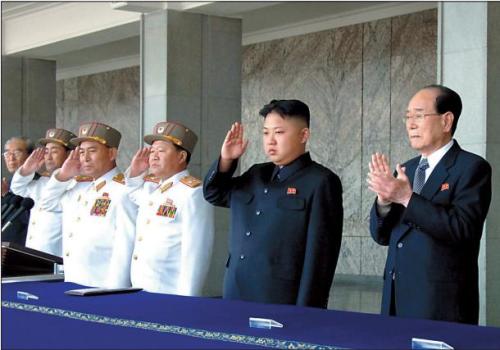
North Korean leader Kim Jong-un (second from right) salutes with Choe Ryong-hae (third from right), vice chairman of the Central Military Commission and Korean People’s Army General Staff Chief Ri Yong-ho (fourth from right) during a mass military parade marking the centenary of the birth of his grandfather, national founder Kim Il-sung in Pyongyang last Sunday. (AP-Yonhap News)
As North Korea’s Constitution says, “The Democratic People’s Republic of Korea carries out all activities under the leadership of the Workers’ Party,” the party is the highest governing authority in the North.
The party convention is its top decision-making apparatus, which is to be held every five years. But it has not been held since the sixth one in 1980, when Kim Jong-il was declared successor to his father Kim Il-sung.
The party representatives’ conference is held to deal with urgent pending issues on a smaller scale. It had not been held for more than four decades until 2010.
Aside from the two party gatherings, the Central Committee comes first in the party’s decision-making hierarchy. The politburo is where senior party officials make policy decisions, which are later pushed for by the secretariat at a working level
Under the secretariat, there are scores of divisions specializing in security, unification, propaganda and other state control functions.
Among them are the Propaganda and Agitation Department: the United Front Department in charge of relations with South Korea; and the Room 39 that raises and manages slush funds of hard currency for Kim’s family.
National Defense Commission/Central Military Commission
Through constitutional amendments in 1998 and 2009, the NDC has become the highest guiding organ for defense management. Under Kim Jong-il’s military-centered policy, the commission has enjoyed an exalted status.
The NDC is a state entity that executes military-related directives and other policies that were crafted mostly by the ruling party’s Central Military Commission or Central Committee.
Although most policy directions are drawn up and determined by the party, the NDC chairman, who also helms the governing party, has played a role as head of state.
Under the committee, there are the state’s intelligence, police and other key security organizations. They include the Ministry of State Security, an equivalent of Seoul’s National Intelligence Service, and the Ministry of People’s Security similar to Seoul’s National Policy Agency.
Military organs under the supervision of the committee include the Ministry of People’s Armed Forces.
There are in fact some overlapping roles between the party and some state organs, for example, roles between the NDC and the CMC. The NDC largely conducts overseas or more conspicuous activities while the party’s CMC moves in a low-key manner, experts said.
Supreme People’s Assembly
The Assembly is the North’s parliament first elected in a 1948 general election. To show to the outside audience that there are democratic elements in its governing system, it regularly holds elections to pick 687 legislators representing districts across the country for a five-year term.
Defectors say that all voters are forced to cast their ballots to pick a single candidate nominated by the party. Some 40 percent of the candidates are general-level military officers with the party seniors accounting for 30 percent. As a formality, the rest include ordinary workers and some farmers.
The Assembly endorses heads of state organs such as the NDC chief and Cabinet members.
By Song Sang-ho (
sshluck@heraldcorp.com)


![[Herald Interview] 'Amid aging population, Korea to invite more young professionals from overseas'](http://res.heraldm.com/phpwas/restmb_idxmake.php?idx=645&simg=/content/image/2024/04/24/20240424050844_0.jpg&u=20240424200058)



